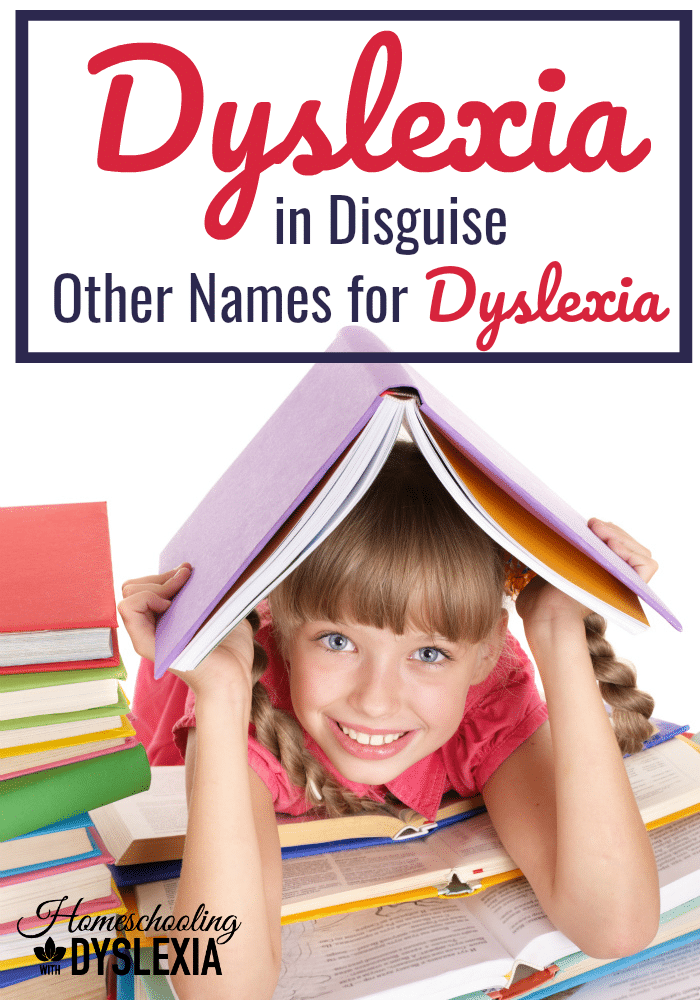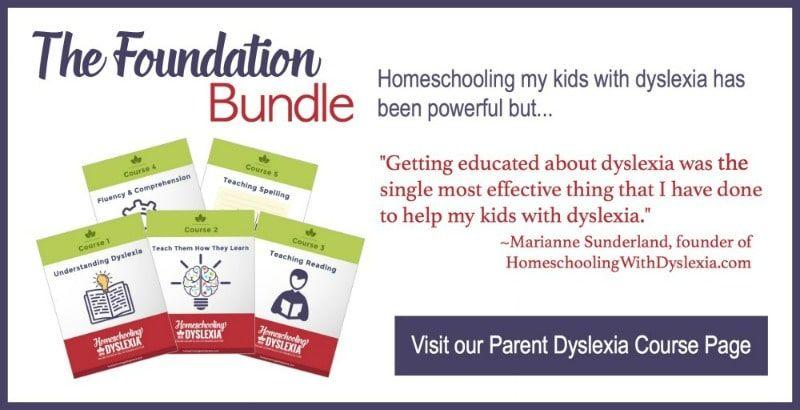I was recently talking with a mom who was telling me that her son had an auditory processing problem and was a terrible reader but did not have dyslexia. This sort of threw me for a loop because I couldn’t figure out why this otherwise bright child didn’t have dyslexia.
This led me on a hunt for information on other names for dyslexia.
Other Names for Dyslexia
Unlike makers of cancer causing MSG that sneakily create multiple names for their product to deceive consumers, these ‘other’ names for dyslexia are not caused by any sinister plan or trickery.
What dyslexia is called depends upon the type of specialist who did the testing, and their understanding and knowledge of dyslexia.
Dyslexia affects many different areas, but some testers only check one area. They find one weakness and come to the wrong conclusion. They don’t realize that weakness may be part of a bigger problem: dyslexia.
Has your child been diagnosed with any of the following but not with dyslexia?
- Auditory Discrimination Problem
- Auditory Processing Disorder
- Central Auditory Processing Disorder (CAPD)
- Orthographic Deficit
- Difficulty remembering spelling patterns
- Dysgraphia
- Dysnomia
- Dysphonetic Deficit
- Phonemic Awareness Deficit
- Reading Disability (RD)
- Reading Fluency Problem
- Short-term or Long-term Memory Deficit
- Specific Language Disability (SLD)
- Visual Processing Disorder
- Visual-Motor Integration Disorder
- Visual Memory Deficit
- Visual Tracking Problem
- Visual Convergence Problem
- Vocabulary on Demand Problem
- Word Retrieval Deficit
- Written Language Disorder
If your child is bright and struggles with reading, learn more about the signs of dyslexia. Dyslexia is the most common cause of reading difficulties and affects many areas of learning besides reading and spelling.
To determine if your child needs to be tested for dyslexia and how to find a qualified tester near you, read this post How and When to Get Your Child Tested for Dyslexia. Although it is not always necessary to have your struggling reader tested for dyslexia, it is vitally important, if you do want testing, to find a tester that understands dyslexia.
Has your struggling reader received a diagnosis listed here? How did you discover that your child had dyslexia?








My daughter has been labeled with about 10 of these. We finally gave up trying to get an accurate diagnosis and focused on getting her the resources she needs.
Hi Kerri
You actually did get an accurate diagnosis. It’s OK to say that a child has ‘dyslexia’ but it doesn’t really tell us what’s wrong. You have to get to the root of the problem in order to remediate for it.
There is a new terminology that is being used… ‘Dyslexia Spectrum Disorders’. It is true that an individual may have one of the disorders listed in Marianne’s post… or several. The severity of each individual disorder is different for each individual. When you get down to the level of diagnosing which disorders constitute your child’s ‘dyslexia’ you can choose the right person, or professional, to help. For example, a qualified teacher may be the right person to help with Phonemic Awareness Deficit whilst a Speech Pathologist might be the right person to help with an SLD. An Irlen Diagnostician might be the right person to go to for visual processing problems.
I’ve come to believe that just saying a child is ‘dyslexic’ isn’t enough. In order to provide the best possible intervention, remediation and accommodations we have to know where the areas of deficit are.
Julie
I love that insight Julie. Thanks for sharing. 🙂
Great article! The biggest problem is dyslexia, capd, etc do not have a code so therefore it’s difficult to get help in the schools (homeschooling is not for every child). Most educators have never heard of majority of these learning differences and have no idea how to teach our children. They can only kind of manage your child and that’s frustrating for the child and parent. Some people are unable to pay out of pocket for a professional assessment and some insurance companies are denying authorization to pay for these tests. What can these parents/gaurdians do?
We have been diagnosed with several of these listed including severe dyslexia. My problem now is finding the right resources and professionals to help us. Where should we start to find them? What program worked best? We are a homeschool family but with the assistance of a charter school. Therefore we should have available some therapies etc. like a public school I just don’t know what to ask for. Can you provide any information or therapies I should request? Thanks so much for your time
Hi Angela. You could ask the person who tested your child. As far as dyslexia, there a lot of resources listed on this site. Have you looked at the Resources page? Also, your charter school overseer should know what services are available through the charter school and how to get them.
Angela,
You are correct, it is difficult finding a specialist able to help. It takes years of experience diagnosing reading difficulties, tweaking what works, and continuously applying new practices. Once you obtain a diagnosis, you need to find someone, usually a reading specialist (a teacher with a Master’s degree in Reading) who can put together a program specifically for your child, one that will remediate the specific areas of difficulty. Pre-packaged programs are usually not effective and lack research to support their use. Orton Gillingham, however, is a program that has been shown to improve reading ability, but the training is extensive and time consuming.
As a reading specialist and special education teacher, I must work with your child for a little while to determine more than the testing can tell me, but I can give you a short list of what you might want to ask for at your child’s school:
1. reading level with fluency, prosody, accuracy, error rate, self-correction rate, and use of meaning, visual, and syntax cues
2. developmental spelling level
3. phonemic awareness levels
4. consistent use of phonics
5. comprehension strategies used and applied consistently
6. writing ability
I wish you luck.
who is good to help with word retrival?
Exactly. My concerns were reading and writing but we were sent on wild goose chases by many different specialists who wanted us to fix 10 other issues that “may cause the reading and writing issues”. We would have saved a ton of time and money just focusing on a tutor trained in dyslexia remediation.
My 9 year old son was screened for a LD back in November and I was told on a phone conference with physcologist that he had severe dyslexia. When I received the evaluation in the mail she has Reading Disorder written as the actual diagnoses. When I called to question the diagnosis I was told that a reading disorder is dyslexia. She did send my sons school another paper that states he has dyslexia. Like you said I think It depends on who does the actual screening. My daughter was diagnosed with dyslexia 5 years ago through a local university and it states Dyslexia on her evaluation papers.
I have been told by so many people that dyslexia is just a name that is given when people don’t know what else to say. I have had my oldest tested several times. I was told ADD and reading comprehension issues and later was told that he just doesn’t like school and doesn’t try. When I looked at the lists I could see him over and over. My youngest has speech and motor delays. I’m already seeing some of those signs in him. I’m not sure anymore about testing because I’ll just get sent back to the same place as before:(
Teresa,
Are you trying to get accommodations in school or are you homeschooling him? You may not need testing at this point if you are homeschooling. Here is a post I did on getting tested for dyslexia:https://dev.homeschoolingwithdyslexia.com/homeschooling-with-dyslexia-get-testing/
I think parents have more information with specific terms as far as what might work for their child. Getting some specific terms, and taking a child’s personality, intelligence, attention, and severity of the LD into account gives a homeschooling parent the ability to individualize teaching. A child will never get this type of individualized instruction in a public or even most private schools.
My 11 year old son was screened for a LD and I was told that he has a reading disorder also known as dyslexia. I was so disappointed, then one of my friends suggested online learning . So I took him out of school and started homeschooling. I used to make him read a lot of books. I trust learning disabilities can be improved by making the child read books and interact with people.
Visual Tracking Problem and Visual Convergence Problem. They are not Dyslexia are they? Visual Convergence issues get treatment from a behavioral optometrist with a series of eye exercises. How is this related to Dyslexia which is an issue with phonemic awareness, and sometimes processing speeds, working and rote memory etc. But not eye issues.
How about the consequent emotional issues of undiagnosed and intermediates dyslexia that can lead to a diagnosis of the range of mental health issues including anxiety disorder and so forth?
Here is an article I wrote about that not too long ago.https://dev.homeschoolingwithdyslexia.com/anxiety-and-dyslexia/
There are several well done Orton Gillingham programs available. Barton Reading and Spelling is specifically designed so that parents can tutor their child at home. As an Advanced Certified Barton Tutor, I have seen the success of the program, first with my own moderate to severely dyslexic son and many others since. There are tutors in many areas like myself who offer both remote and in person tutoring. Contact Susan Barton at Barton Reading and Spelling for information and lists of tutors in your area.
im daniel and i am not sure if i have dyslexia and my social studys teaacher said to me last year that i did have it on my record and i dont know if i have it or not i have trouble pronoucing words and spelling words and rembering things and i can read rapidly but after i read something fast i dont rffember what the text said so do i have dyslexea or not